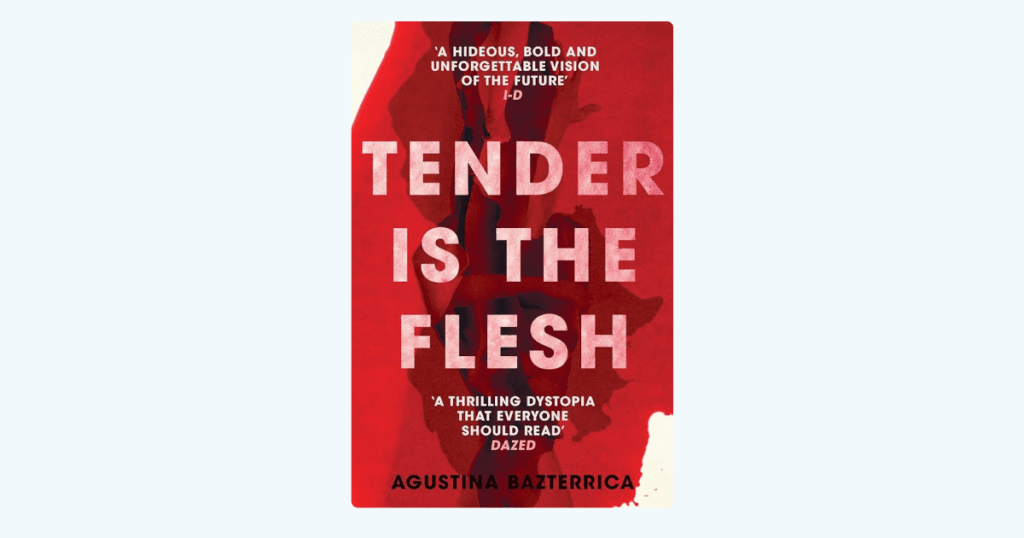In the realm of dystopian fiction, few books have made as strong an impact as Tender Is the Flesh. Written by Argentinian author Agustina Bazterrica, this chilling novel has captured the attention of readers worldwide with its bold and disturbing themes. The book asks a deeply unsettling question: what happens when humans are no longer able to consume animal meat, and instead, turn to cannibalism? This premise pushes the boundaries of moral, ethical, and societal norms, creating a haunting narrative that leaves a lasting impact. In this article, we’ll explore what makes The Book such a compelling and thought-provoking read.
The Dark World of Tender Is the Flesh

At the heart of Tender Is the Flesh is a dystopian world where a virus has rendered animal meat unsafe for consumption, leading to the legal and industrialized farming of humans for food. The story follows Marcos, a man who works in a processing plant for “special meat” — a euphemism for human flesh. Marcos is emotionally detached from his job, but as the novel unfolds, the complexities of his internal struggles become increasingly evident. The Book forces readers to confront uncomfortable truths about the human condition, raising questions about what it means to be human and how far society is willing to go to survive.
Themes of Morality and Dehumanization
A significant aspect of The Book is its exploration of morality. Bazterrica’s novel is a brutal commentary on the way humans can rationalize cruelty when it becomes normalized within society. The shift from farming animals to farming humans in the novel is portrayed as a logical, albeit horrifying, transition in response to a global crisis. As Marcos navigates this new reality, readers are forced to grapple with the ethical implications of treating human beings as livestock.
One of the key themes in The Book is dehumanization. The novel strips away the humanity of the people being farmed, referring to them as “heads” or “special meat,” thereby allowing the characters to distance themselves from the horror of their actions. This systematic dehumanization serves as a powerful critique of modern industries that exploit animals and other human beings under the guise of necessity.
The Psychological Impact of Tender Is the Flesh
Reading The Book can be an emotionally challenging experience. The novel’s graphic descriptions of the human farming process and its unflinching depiction of cruelty are not for the faint of heart. However, these elements serve a purpose beyond shock value. The visceral nature of the story forces readers to confront their own discomfort, making them question their relationship with meat consumption, the environment, and the ethics of survival.
The novel also delves into the psychological toll this new world takes on its characters. Marcos, who has become numb to the horrors around him, begins to unravel as the narrative progresses. His journey reflects the broader theme of human desensitization to violence and cruelty, raising questions about how much individuals can endure before they lose their humanity altogether.
Critical Reception of Tender Is the Flesh
Since its release, Tender Is the Flesh has received widespread acclaim for its bold narrative and thought-provoking themes. Critics have praised Bazterrica’s ability to blend dystopian horror with deep philosophical questions about society, morality, and survival. The novel has been compared to works such as The Road by Cormac McCarthy and 1984 by George Orwell, as it challenges readers to reflect on the dark potential of humanity when faced with extreme circumstances.
Many reviews highlight the novel’s capacity to disturb and provoke, with some calling it a modern classic in the dystopian genre. However, due to its intense subject matter, The Book is not a book that everyone will find easy to read. It requires a strong stomach and a willingness to engage with difficult ideas about life, death, and the ethics of consumption.
The Ethical Questions Raised by Tender Is the Flesh
One of the most powerful aspects of The Book is the ethical questions it raises. The novel forces readers to think about the way society values life, particularly in relation to consumption and commodification. Is it morally acceptable to farm humans if it ensures survival? How does the novel’s portrayal of industrialized human farming mirror real-world practices in the meat industry?
These questions are central to the novel’s impact, as they compel readers to draw uncomfortable parallels between the fictional world of The Book and the ethical dilemmas we face in the real world. The book serves as both a critique of industrialized farming and a broader meditation on the moral costs of survival in a dystopian future.
Why Tender Is the Flesh Is a Must-Read for Dystopian Fans
For fans of dystopian fiction, Tender Is the Flesh offers a unique and disturbing vision of the future that is both thought-provoking and deeply unsettling. The novel’s exploration of dehumanization, survival, and morality makes it a standout in the genre. While it may be a difficult read for some due to its graphic content, the novel’s ability to challenge and provoke deep reflection makes it a must-read for those interested in philosophical and ethical questions about the future of humanity.
FAQs
What is The Book about?
The Book is a dystopian novel set in a world where animal meat is no longer safe to consume, leading to the legal farming of humans for food. The story follows Marcos, who works in a human processing plant, as he grapples with the ethical and psychological ramifications of this new world.
Is The Book a horror novel?
While The Book contains elements of horror, particularly in its graphic depiction of human farming, it is primarily a dystopian novel that explores themes of morality, dehumanization, and survival.
Who is the author of The Book?
The novel is written by Argentinian author Agustina Bazterrica, whose work has garnered international acclaim for its bold and unsettling exploration of human nature.
Why is The Book so disturbing?
The novel’s disturbing nature comes from its graphic portrayal of a world where humans are farmed and consumed like livestock. It forces readers to confront uncomfortable questions about morality, survival, and the value of human life.
What are the key themes in The Book?
Key themes in the novel include dehumanization, morality, survival, and the ethics of consumption. The book critiques industrialized farming practices while exploring how far society will go in the face of crisis.
Is The Book worth reading?
For fans of dystopian fiction and thought-provoking literature, The Book is a compelling and disturbing read. It offers a unique perspective on the future of humanity and raises important ethical questions.
What is the meaning of Tender Is the Flesh?
Tender Is the Flesh explores the dehumanization of society and the moral decay that occurs when humans are commodified. The title itself reflects the vulnerability of human life when it is reduced to mere flesh, highlighting the fragility of our moral boundaries when survival is at stake. It is a dystopian commentary on how easily humans can become objects under extreme circumstances, questioning the ethics of consumption and societal norms.
Is Tender Is the Flesh disturbing?
Yes, Tender Is the Flesh is widely regarded as disturbing due to its graphic depictions of human farming and cannibalism. The novel does not shy away from describing the brutal realities of a world where humans are treated as livestock, forcing readers to confront unsettling questions about morality, ethics, and the human capacity for cruelty. Its dark, dystopian themes leave a profound and often uncomfortable impact on readers.
Is Tender Is the Flesh a horror book?
While Tender Is the Flesh contains elements of horror, particularly in its graphic depictions of violence and cannibalism, it is primarily classified as dystopian fiction. The horror in the novel is not supernatural but rooted in the unsettling depiction of a world where human flesh is farmed for consumption. The psychological and moral horrors of this society are what make the novel deeply disturbing.
What happened at the end of Tender Is the Flesh?
At the end of Tender Is the Flesh, Marcos, the protagonist, succumbs to the horrifying societal norms he has been struggling against throughout the novel. After initially showing empathy toward a captive woman, he ultimately treats her as meat, symbolizing his complete loss of humanity. The ending is bleak and reinforces the novel’s central theme of dehumanization and moral decline, leaving readers with a chilling conclusion.
What is the philosophy of Tender Is the Flesh?
The philosophy of Tender Is the Flesh centers around ethical and moral questions regarding the commodification of life, dehumanization, and survival. The novel critiques industrialized farming practices by presenting a dystopian future where humans are farmed for consumption. It challenges readers to consider the value of life and how societal norms can shift to accommodate even the most inhumane practices under the right circumstances.
Is Tender Is the Flesh a warning?
Yes, Tender Is the Flesh can be seen as a warning about the dangers of dehumanization and the ethical pitfalls of unchecked capitalism and industrialization. The novel’s dystopian world serves as an extreme metaphor for modern-day issues such as animal exploitation, environmental destruction, and moral decay in the face of survival. It cautions against the loss of empathy and humanity in a world driven by consumption and profit.
Is Tender Is the Flesh easy to read?
While Tender Is the Flesh is written in a clear and accessible style, the content is emotionally and psychologically challenging. The graphic depictions of violence and the disturbing nature of the story make it difficult for some readers to get through, even if the prose itself is not complex. The book is more unsettling than difficult in terms of language, but it requires a strong emotional constitution to read.
How graphic is Tender Is the Flesh?
Tender Is the Flesh is quite graphic in its depictions of violence, particularly the processing of human bodies for consumption. The novel includes detailed descriptions of slaughterhouse practices, the physical treatment of humans as livestock, and the emotional and psychological toll on the characters. While not gratuitous, the graphic content is integral to the novel’s exploration of its dark themes.
Is Tender Is the Flesh appropriate for 13 year olds?
Tender Is the Flesh is not appropriate for 13-year-olds due to its graphic content and mature themes. The novel deals with disturbing topics such as cannibalism, violence, and the dehumanization of people, which may be too intense for younger readers. Its exploration of morality and survival is aimed at a more mature audience who can handle the emotional and ethical weight of the story.
What age is Tender Is the Flesh for?
Tender Is the Flesh is best suited for readers aged 18 and up, as it contains graphic violence, disturbing themes, and complex moral questions. The novel’s dark and unsettling nature, combined with its philosophical depth, makes it more appropriate for mature readers who can engage with the difficult subject matter on an intellectual and emotional level.
What are the main themes of Tender Is the Flesh?
The main themes of Tender Is the Flesh include dehumanization, survival, morality, and commodification. The novel explores how societal norms can shift to accept even the most inhumane practices when survival is at stake. It also critiques industrialized farming and the ethical implications of treating living beings as commodities. The loss of empathy and the erosion of moral values are central to the novel’s dystopian vision.
Is Tender Is the Flesh a TV series?
As of now, Tender Is the Flesh has not been adapted into a TV series. However, due to the novel’s compelling and disturbing narrative, it has the potential to be adapted into a film or television series in the future. The book’s cinematic qualities and its exploration of dystopian themes make it an intriguing candidate for such adaptations.
Tender Is the Flesh is a haunting exploration of humanity, morality, and survival. Its dystopian setting and disturbing premise challenge readers to reflect on the ethical dilemmas posed by a world that normalizes the consumption of human beings. Though unsettling, the novel’s thought-provoking themes and bold narrative make it a must-read for fans of dystopian fiction and anyone interested in examining the darker sides of human nature.
To read the latest articles please visit the home page of Turk Blogs.





